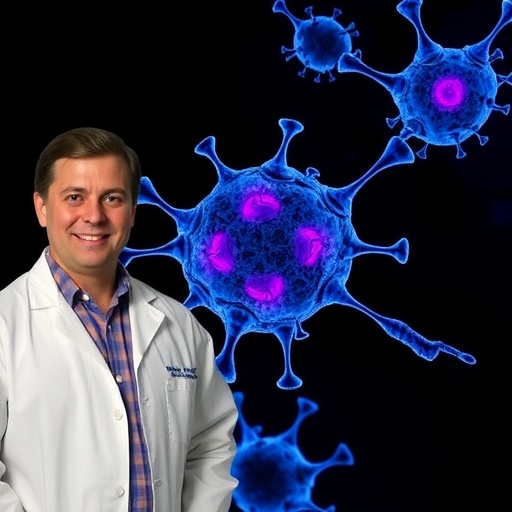In a landmark development at the forefront of hematologic oncology, researchers from The Tisch Cancer Institute at the Icahn School of Medicine at Mount Sinai have successfully pioneered a targeted therapeutic approach to treat a rare and aggressive T-cell lymphoma that emerged following CAR T-cell therapy for multiple myeloma. This unprecedented breakthrough, detailed in the August 21, 2025 issue of the prestigious New England Journal of Medicine, showcases the power of precision medicine in managing complex secondary malignancies that may arise as complications of cutting-edge immunotherapies.
Chimeric Antigen Receptor (CAR) T-cell therapy, a revolutionary immunotherapeutic technique, reprograms a patient’s own immune cells to recognize and eradicate malignant cells with remarkable specificity and efficacy. With its transformative impact on multiple myeloma, CAR T-cell therapy targeting B-cell maturation antigen (BCMA) has entered the therapeutic arsenal as a beacon of hope for patients with otherwise refractory disease. However, despite its profound benefits, this therapy carries risks of unforeseen adverse outcomes, including the emergence of secondary cancers, such as T-cell lymphomas, a scenario that poses significant clinical challenges and demands innovative solutions.
The case under study involves a 51-year-old patient who achieved complete remission of multiple myeloma following anti-BCMA CAR T-cell infusion. Unfortunately, the patient subsequently developed an aggressive CAR-positive T-cell lymphoma characterized by rapid progression and multifocal involvement encompassing the skin, peripheral blood, and bone marrow. This clinical conundrum presented a rare but critical opportunity to explore novel therapeutic avenues against such secondary hematologic malignancies that defy conventional treatment paradigms.
.adsslot_dzjpNWLtAk{width:728px !important;height:90px !important;}
@media(max-width:1199px){ .adsslot_dzjpNWLtAk{width:468px !important;height:60px !important;}
}
@media(max-width:767px){ .adsslot_dzjpNWLtAk{width:320px !important;height:50px !important;}
}
ADVERTISEMENT
Employing sophisticated genomic and immunologic profiling platforms developed within Mount Sinai’s research infrastructure, investigators conducted an exhaustive characterization of the lymphoma’s molecular landscape. These analyses enabled the identification of aberrant cellular pathways and surface markers that could serve as actionable therapeutic targets. Their strategy incorporated leveraging Food and Drug Administration (FDA)-approved compounds, thereby facilitating expedited clinical translation and circumventing the extensive timelines typically necessary for new drug development.
Central to this therapeutic triumph was the novel application of an anti-CCR4 (CC chemokine receptor 4) antibody. Traditionally not utilized in this context, the antibody demonstrated selective cytotoxicity against the malignant T-cell population expressing this receptor, effectively eradicating the lymphoma. This targeted immunotherapy not only eliminated the T-cell lymphoma but was also well-tolerated, ensuring sustained remission without compromising prior control of the patient’s myeloma. This dual disease remission embodies a critical milestone, affirming the feasibility of using precision immunotherapeutic strategies against complex CAR T-cell therapy-induced malignancies.
Dr. Samir Parekh, MD, Director of the Center of Excellence for Multiple Myeloma at Mount Sinai and senior author on the study, emphasized the broader implications of this case. He highlighted the necessity for vigilant monitoring for secondary cancers post-CAR T therapy and underscored the vital role of precision medicine frameworks in rapidly tailoring effective interventions. This case impeccably illustrates the evolving understanding that therapeutic modalities must adapt dynamically to the biological intricacies introduced by innovative cancer treatments.
The investigative team’s work represents a multidisciplinary effort uniting experts in molecular biology, immunology, genomics, and clinical oncology. Collaborators included the laboratories of Joshua Brody, MD, Patrick Brunner, MD, MSc, and The Parekh Lab, alongside the Icahn Genomics Institute and multiple departments within the Icahn School of Medicine. This convergence of expertise was pivotal in unraveling the complex pathobiology of secondary CAR-positive T-cell lymphomas and delineating targeted treatment strategies.
This research also underscores the necessity for the development of next-generation CAR T therapies with enhanced safety profiles designed to minimize immunogenic and oncogenic sequelae. Mount Sinai’s ongoing efforts aim to refine CAR T-cell constructs and optimize patient monitoring protocols, ultimately striving to mitigate the incidence of such rare but devastating side effects. The future of hematologic cancer therapy hence lies in harmonizing potent antitumor efficacy with maximal patient safety.
Notably, the identification of anti-CCR4 antibody as an effective agent marks a significant advancement in the expanding repertoire of immunotherapeutic options available for T-cell malignancies. CCR4, a chemokine receptor implicated in T-cell migration and tumor microenvironment interactions, represents an attractive target for selective immunomodulation. By harnessing existing FDA-approved drugs in novel clinical contexts, researchers have opened promising avenues for rapid therapeutic innovation that could extend beyond this unique case.
The success documented here lays a foundational precedent for addressing secondary malignancies arising from immunotherapy, a challenge that is anticipated to become more prevalent as these treatments deepen their footprint across oncologic indications. This paradigm advocates for comprehensive molecular profiling and adaptive treatment planning as cornerstones of modern cancer care, envisioning personalized strategies to circumvent therapy resistance and emergent complications.
In conclusion, this dramatic clinical success story not only illuminates the path toward conquering rare CAR-positive T-cell lymphomas induced by CAR T-cell therapy but also exemplifies the synergistic potential of translational research in revolutionizing patient outcomes. As immunotherapy continues to reshape cancer treatment landscapes, stories like this reinforce the critical importance of vigilance, flexibility, and innovation in managing the intricate balance between therapeutic benefit and risk.
Subject of Research: People
Article Title: Targeted Therapy of CAR+ T-Cell Lymphoma after Anti-BCMA CAR T-Cell Therapy
News Publication Date: 21-Aug-2025
Web References:
New England Journal of Medicine, DOI: 10.1056/NEJMc2504588
Keywords: Cancer treatments, Multiple myeloma
Tags: aggressive T-cell lymphoma treatmentCAR-T cell therapy complicationshematologic oncology advancementsimmunotherapy adverse effectsMount Sinai cancer researchMultiple Myeloma Treatment Innovationsprecision medicine in oncologyrare lymphoma targeted approachesreprogrammed immune cells in cancersecondary malignancies after immunotherapytargeted therapy for T-cell lymphomaTisch Cancer Institute breakthroughs





